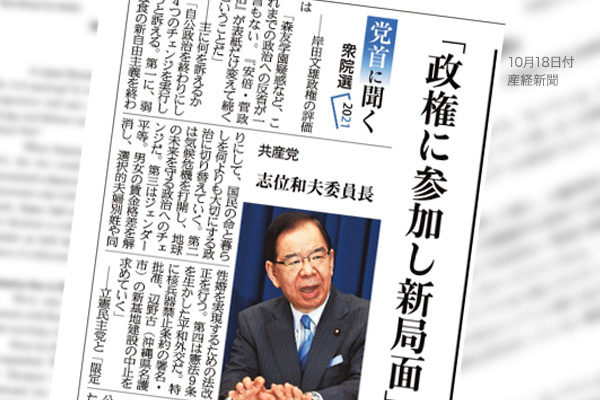Campaigns have started for the October 31 general election of Japan’s House of Representatives. A remark by Secretary General Akira Amari of the ruling Liberal Democratic Party got to the bottom of the coming election. “The election amounts to a choice between a liberal democratic government and a regime that would embrace communism for the first time.”
Seeing the coming election as having potential to allow the Japanese Communist Party to take part in a ruling coalition, the party has made great concessions to the Constitutional Democratic Party of Japan, the largest opposition party, in coordinating candidates, abandoning its target of collecting 8.5 million votes for the proportional representation component of the election in last-ditch efforts to join a coalition government. CDP leader Yukio Edano has been vague whether the JCP could be included into a CDP-led coalition government but has not denied the possibility of treating the JCP as an ally without inviting any JCP member to participate in the cabinet. The JCP might have bet its fate on the coming election, departing from its reiterated stance that it would seek only mutually beneficial election cooperation with any other political party.
Why? As approval ratings for the administration led by new LDP President and Prime Minister Fumio Kishida are not very high, the JCP might have pulled out a wild card to cooperate with the CDP in winning power from the LDP and its junior coalition partner Komeito.
JCP has yet to rule out violent revolution
There might have been various reasons for the JCP to do so. As the JCP will mark its centennial next year, it may not want to remain stagnant any longer. Maneuverer Ichiro Ozawa now in the CDP might have played a role in engineering cooperation between the two parties.
At its convention in January 2020, the JCP deleted its favorable view of the Chinese Communist Party as an ally from its platform because of the Japanese public’s strong anti-China sentiment. At the end of the year, the JCP protested against the Public Security Intelligence Agency’s designation of the party as subjected to investigations under the Subversive Activities Prevention Act, collaborating even with the moderate Democratic Party for the People.
This year, the JCP began to deny its theory that the choice between a violent revolution or a pursuit of parliamentary majority depends on the enemy’s attitude, claiming that the JCP of today has nothing to do with such theory. That is a lie. Postwar JCP leaders Kenji Miyamoto and Tetsuzo Fuwa denied parliamentary democracy and expelled Shojiro Kasuga and other parliamentarists when drafting a party platform in 1961. They also harshly criticized the then Japan Socialist Party’s parliamentarism.
Miyamoto told a JCP meeting that the choice between a violent revolution or a pursuit of parliamentary majority would depend on the enemy’s attitude and that specific measures for the choice did not have to be written in any document, as noted by Vladimir Lenin, the JCP’s official paper Akahata reported on January 4, 1958. Fuwa amplified the Miyamoto approach, calling it “people’s parliamentarism.” His paper released on April 29, 1967, detailed the approach, becoming a must-read for JCP members.
Japan-U.S. security partnership could collapse
Nevertheless, incumbent JCP Chairman Kazuo Shii began this year to claim that the party would not mention such enemy’s attitude theory. If so, he should apologize to the public that the Miyamoto-Fuwa approach was wrong. The JCP has refrained from revealing its strategy. If the strategy is revealed, the JCP may come under some action based on the Subversive Activities Prevention Act. The Public Security Intelligence Agency has subjected the JCP as well as right wing and extremist groups to its investigations under the act because the agency has judged that the JCP has yet to abandon the enemy’s attitude theory. The JCP has been desperate to break down the barrier of the act.
If a CDP-led coalition government is realized, irrespective of whether the JCP would join in a coalition cabinet, the government will first seek to relieve the JCP from the act, then abolish it and modify or terminate the Public Security Intelligence Agency. The CDP will agree with the measures. If the JCP takes part in a cabinet, the Japan-U.S. security partnership will not be maintained. The CDP-led government will abolish the peace and security law and cancel the construction of a U.S. military base in Henoko, Okinawa Prefecture, as specified in an agreement between opposition parties for their election cooperation. We should not allow such dangerous government takeover. Prime Minister Kishida has said politics is about preparing for emergencies. It would be dangerous if we do not prepare for the creeping JCP.
Shohei Umezawa is Chairman of the Council of the Japan Institute for National Fundamentals and Professor Emeritus at Shobigakuen University.


